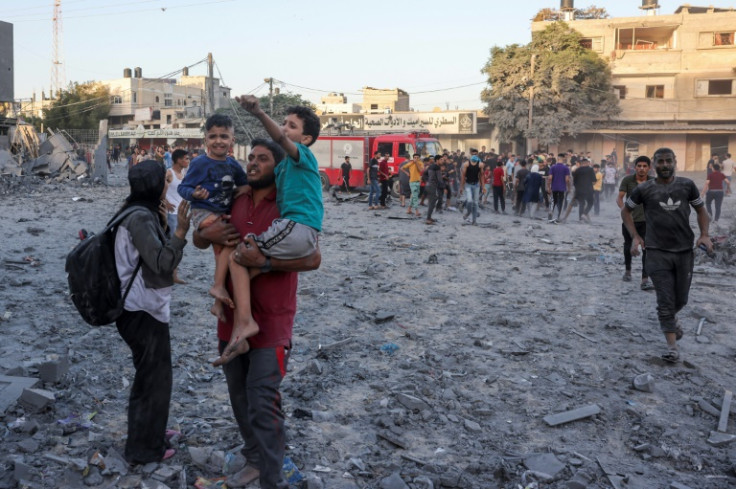Broad Push, Narrow Achievements From US On Gaza War

One month into the Israel-Hamas war, the achievements of US-led diplomacy have been small or subtle, but both supporters and critics say that is partly by design.
US Secretary of State Antony Blinken, completing his second whirlwind crisis tour, insisted that all leaders he spoke to wanted "American leadership."
"Every country I talk to is looking for us to play a leading role with our diplomacy to try to make progress on all of these different aspects of the crisis," Blinken told reporters Monday in Ankara.
But leaders in the Arab world, and many elsewhere, have called for a ceasefire, an idea not backed by the United States, which says Israel has the right to respond.
Israel has been pounding the Gaza Strip since October 7 when Hamas militants stormed into the country and killed 1,400 people, according to Israeli officials, in attacks mostly on civilian targets.
The Hamas-run health ministry says that more than 10,000 people have died in Israeli strikes since then, including more than 4,000 children.
Blinken instead called on his latest trip for "humanitarian pauses" to let aid into the impoverished Gaza Strip, which is run by Hamas and has been under an Israeli blockade since 2007.
Israeli Prime Minister Benjamin Netanyahu did not back Blinken's idea but the White House said that President Joe Biden again raised "tactical pauses" in a telephone call Monday.
The United States has highlighted some progress in alleviating the plight of Gaza residents, including by persuading Israel partly to restore water and electricity.
US diplomats also negotiated the reopening of the Rafah crossing from Egypt, although the 476 trucks that have crossed are fewer than the number that went each day before October 7.
A primary goal for Blinken has also been to prevent the spread of the war to additional fronts -- particularly Lebanon, where Iranian-backed Hezbollah is far better armed than Hamas.
While US officials have not claimed a win, some observers saw a long-awaited speech Friday by Hezbollah chief Hassan Nasrallah as holding off on more direct confrontation.
James Jeffrey, a veteran US diplomat who led efforts against the Islamic State group under former president Donald Trump, said that Blinken set out with a mission foremost to prevent escalation by pro-Iranian forces and secondly to assuage outraged public opinion.
"So I would say that Blinken achieved his goal on this trip," said Jeffrey, now chair of the Middle East program at the Wilson Center.
He said that the ferocious Israeli response in Gaza in itself served as a deterrent to Hezbollah and Iran, telling them "we will do the same and worse to you" if there is escalation.
But he said Israel's tactics complicated the second US goal of addressing public opinion as Blinken was "trying to get the Israelis to let other things be in the news."
Blinken wanted to "help Arab states with their own populations, and frankly to help Biden domestically, by emphasizing that America is all in on avoiding civilian casualties and taking the lead on humanitarian assistance to the people of Gaza," Jeffrey said.
"There it's a tough lift, because, frankly, the Israelis are not as helpful as they should be," he said.
Diana Buttu, a former legal advisor to Palestinian negotiators with Israel, scoffed that Blinken could not even achieve humanitarian pauses, considering how much Israel relies on Washington.
"If Blinken were traveling commercially, he would be earning lots of miles -- and that's it," she said.
"He's playing this game of trying to appease the Arab states and the rest of the world, while at the same time giving Israel the green light," she said.
"To say that somehow the US doesn't have a say in the billions of dollars that it gives is to downplay the role of the US," she said.
Blinken and Biden have voiced support for Israel, despite their pre-October 7 criticism of Netanyahu's hard-right government, and both Democratic and Republican lawmakers have backed increasing assistance following the Hamas attacks.
Jon Alterman, the director of the Middle East program at the Center for Strategic and International Studies, said that the United States has always faced criticism in the Arab world and doubted that US officials believed it was irreversible.
The Israelis in their campaign against Hamas "are moving further away from their neighbors, they're moving further away from much of the world, and the US is trying very hard to diminish that gap," he said.
"It strikes me as very typical diplomacy. It's always slower and more partial than you'd like it to be," he said.



© Copyright AFP 2024. All rights reserved.



















